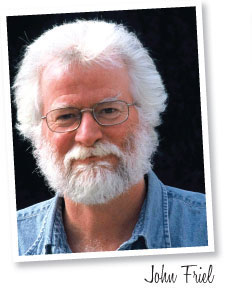5/1/2020
A Different Kind of Wilderness
John Friel

A group of rafters made headlines in March. Their 25-day float through the Grand Canyon left them clueless about COVID-19. Briefed, one wondered aloud: “Why would a respiratory virus make people buy all the toilet paper?”
Great question, isn’t it? I kinda have an answer.
I rafted those same 226 river miles in September 2001, when a different lethal evil seemed to lurk everywhere. Unlike this group, our crew knew what had happened. But once launched, we seldom discussed 9/11. When the Here and Now is a violent, frigid river sweeping you through scorching desert wilderness, it demands your full attention.
On extended river trips, critical stuff rides in waterproof cases. Food, water filter (you can’t carry enough potable water, you purify en route), first-aid supplies, cameras, full kitchen, toilet and of course, toilet paper. Fun fact: You don’t leave anything in the Canyon. Even solid human waste comes out with you. It’s the law.
A few days in, we discovered we’d already run out of toilet paper. We rowed to shore at Phantom Ranch, the one place in the Canyon with actual toilets, and ransacked our rafts in vain. After using the facilities we stole every inch of TP that would fit under our shirts and hiked back to the rafts puffed up like parade floats. With 140 miles and two weeks to go, rationing seemed inevitable.
A day later, someone—Yay!—finally found the rest of our stash. It was like discovering gold. Better, even. Gold is a lousy substitute for TP, which may soon be currency.
On we went, each day farther from, and closer to, reality. The horticulturists among us enjoyed the rare furnace-proof flora: ocotillo, Opuntia, monkey flower, Datura, and the mixed blessing/curse of Tamarisk, all thriving in Hades.
We also enjoyed the fauna or most of it. Canyon wrens, mischievous ravens, big-horned sheep and ubiquitous lizards: all very cool. Tarantulas, red ants and scorpions: much less so.
We’re all currently navigating a sort of wilderness that—unlike Grand Canyon—looks just like home. Surrounded by the familiar, we are nonetheless in terra incognita, where something potentially lethal lurks everywhere.
My first Ball Publishing column concerned 9/11. I hope COVID-19 isn’t the topic of my last one, but my age puts me uncomfortably close to its crosshairs. Then again, I’m younger than every remaining Presidential contender, which is simultaneously comforting and troubling.
I’m lucky: I can work from home. My thoughts are with those, in our industry and beyond, who lack that option. Many growers probably wish they were more automated, maybe just enough to eliminate one daily circuit, one series of dangerous exposures.
Finding commonalities is diverting, but unlike this voyage, nobody died in the Canyon. It’s a time remembered fondly by all. No one will look back wistfully on this mess.
A foolish few are still indulging their own heedless hedonistic whims, ignoring urgent messages from home and abroad. Some of those foolish few won’t be here to see our new normal when it arrives, which sounds like rough justice. The great injustice is, they’ll take others, especially front-line caregivers, down with them.
Which constitutes another Canyon parallel: Wilderness quickly teaches you, sometimes the hard way, to avoid stupid risks that endanger other people. I don’t just mean hotdogging in rapids or on cliffs: the majority of wilderness evacuations involve not injury, but illness spread via poor hygiene. Not washing your hands is a stupid risk.
In time, our doors, stores and arms will reopen. Until—and after—that fearless day breaks, may our hearts never close. GP
John Friel is marketing manager for Emerald Coast Growers and a freelance writer.